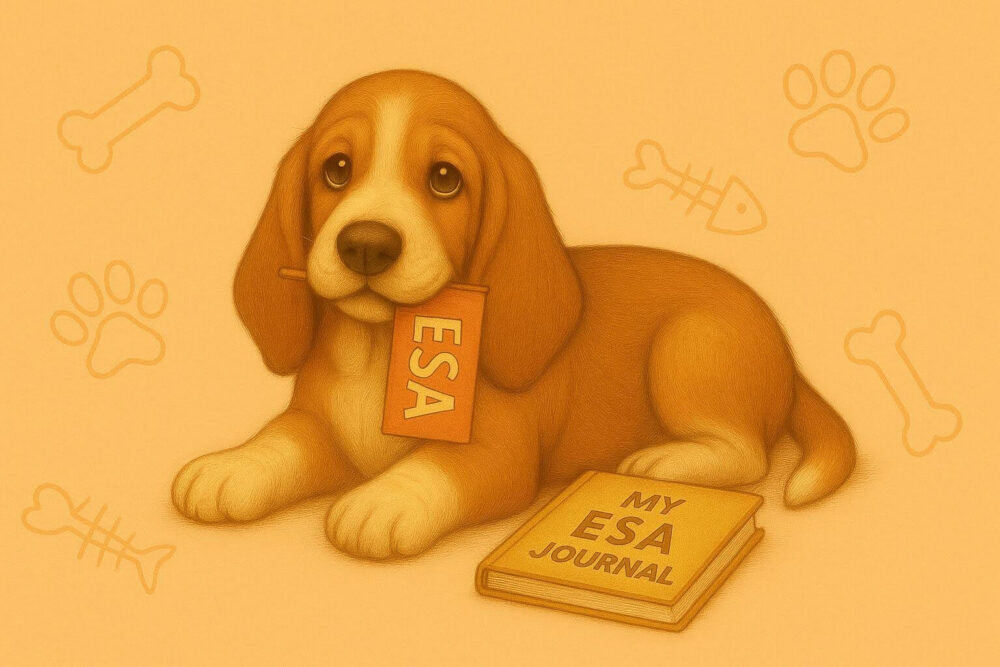
Table of Contents
The cost of pet care is skyrocketing—with veterinary bills expected to rise 11% this year, grooming supplies jumping 20%, and your pal’s favorite munchies soaring 85%. And if you rely on an emotional support animal (ESA) for mental health, these expenses aren’t optional; they’re essential care.
While everyone seems to be searching for creative ways to stretch their budgets, those with a Flexible Spending Account (FSA) might wonder: Can I use FSA for my emotional support animal?
The answer isn’t a simple yes or no, but we’re here to help. In this guide, we’ll break down:
- What the IRS guidelines say about FSA reimbursement
- What type of expenses are (and aren’t) covered
- What documentation is required to justify expenses, and how to get it easily
Flexible Spending Account (FSA) Basics—How Does It Work?
A Flexible Spending Account is a special savings account offered through your employer that allows you to set aside pre-tax dollars for certain healthcare expenses. The key advantage of an FSA over regular savings accounts is that since the money you contribute isn’t taxed, you’re effectively getting a discount on your medical expenses.
Here’s how the process typically works:
- Every paycheck, a slice of your income gets tucked into your FSA before Uncle Sam can take a bite
- You can dip into this fund for IRS-approved health costs, like doctor visits, prescriptions, and medical devices
- FSAs operate on a “use it or lose it” rule, so you forfeit any money you don’t spend by year-end (some employers offer a grace period of up to 2 ½ months)
Not everything qualifies for an FSA reimbursement, though—things like cosmetic procedures, gym memberships, and pet-related expenses usually don’t make the cut.
FSAs are tied exclusively to your employer, so you’ll need to work for a company that offers this benefit. You also lose unused funds when changing jobs. This makes them different from Health Savings Accounts (HSAs), which are portable, employee-owned accounts that let you roll over funds year-to-year, but you need a high-deductible health plan (HDHP) to qualify for one.

Is an Emotional Support Animal Eligible for FSA?
Since FSAs only cover IRS-qualified medical expenses, the big question is whether the IRS considers emotional support animals a medical cost.
The IRS Publication 502 mentions that expenses for buying, training, and maintaining guide dogs and service animals are tax-deductible. However, the official guideline doesn’t explicitly mention that ESAs have the same benefits. It’s important to understand the difference:
- Service animals are specifically trained to perform tasks or assist people with disabilities (like guiding a blind person or alerting to seizures)
- Emotional support animals provide comfort through companionship alone and aren’t required to have specialized training
Because ESAs aren’t trained to perform disability-related tasks, they don’t fall under the same legal classification as service animals under the Americans with Disabilities Act (ADA).
But that doesn’t mean you’re totally out of luck!
The IRS approves costs related to diagnosis, therapy, and psychiatric treatment. This means that while the animal itself might not qualify for FSA reimbursement, the costs associated with the mental health evaluation and treatment that lead to an ESA recommendation might.
The ESA letter process involves consultation with a licensed mental health professional (LMHP), such as a licensed therapist, psychiatrist, nurse practitioner, or clinical social worker. These consultations can cost anywhere from $100 to $250 a pop, so you might be able to get this amount reimbursed.
The exact rules depend on your FSA provider, so always check with your specific plan administrator before assuming an expense will be covered.
What ESA Expenses May Not Be Covered
Beyond the initial medical consultation, ESA letter fees (when prescribed as part of your treatment plan), follow-up therapy sessions, and most of the day-to-day costs of owning an ESA don’t qualify for FSA reimbursement. These include:
- The adoption fees or purchase cost of the animal itself
- General pet care (food, grooming, toys)
- Routine veterinary care (vaccinations, check-ups)
- Pet insurance premiums
- Training classes
If you have a service animal, however, many of these costs—food, grooming, and veterinary care—can be covered by your FSA, since the IRS explicitly recognizes them as medical necessities for people with disabilities.
How To Get FSA Emotional Support Animal Reimbursement
Once you’ve figured out which expenses for your emotional support animal are eligible for FSA reimbursement, here’s the step-by-step process for getting a refund:
- Gather the necessary documents
- Submit your claim
- Get reimbursement
Gather the Necessary Documents
Before you can unleash (pun intended) your FSA claim, you’ll need to round up the correct paperwork. All FSA claims require you to have itemized receipts showing:
- Date of service
- Provider’s name
- Description of the service or product
- Amount paid
For services like therapy sessions or medical evaluations, the receipt must clearly state the purpose of the visit (e.g., “psychiatric evaluation for anxiety treatment”). Generic credit card statements or handwritten notes won’t cut it—the IRS requires detailed proof.
For ESA-related claims, you’ll also need a Letter of Medical Necessity (LMN) from a licensed healthcare provider clearly stating that the ESA is part of your treatment plan for a diagnosed mental health condition.
Submit Your Claim
With the paperwork ready, you can file an FSA reimbursement request online, through direct mail, or via fax. Most providers offer digital claim submission using their online portal or mobile app, which is the fastest and easiest route.
You’ll need to fill out a claim form and attach all your supporting documents. The form generally asks for basic details like your name, the date of service, the provider’s information, the type of service received, and the amount you request for reimbursement.
Get Reimbursement
Once your claim is in, it’s time to sit back with your cuddly buddy by your side and wait for the reimbursement, which typically takes a few business days. FSA emotional support animal reimbursements commonly work in one of two ways:
- Direct deposit: If you opted for direct deposit, the funds will drop right into your bank account
- FSA debit cards: Some employers issue FSA debit cards that let you pay for eligible expenses directly from your FSA balance, instead of reimbursing them afterward. These cards auto-deduct eligible expenses from your FSA balance, eliminating paperwork. However, you should still keep your receipts, as some administrators might request documentation later for verification

The Importance of the Right ESA Documentation
Your furry friend is only considered an “official” emotional support animal when you have the proper documentation. Most FSA administrators will reject claims for ESA expenses unless you prove they’re tied to a legitimate medical treatment plan through a professional ESA letter issued by a qualified LMHP.
Without this letter, you not only lose FSA benefits, but also miss out on other housing protections designed for ESAs, like access to pet-free housing or not having to pay monthly pet rent. A compliant ESA letter must:
- Be issued by an LMHP in your state on their official letterhead
- Include the LMHP’s license details and contact information for verification
- Mention your name along with a statement confirming your condition under DSM-5-TR guidelines (specific diagnosis details aren’t required)
- Clearly state that the ESA is part of your treatment plan
This letter is the only valid paperwork you need to live with your little fluffball anywhere. You don’t need fancy ESA registration, certification, or shiny gold-plated ID tags that many fraudulent websites and services advertise.
Where To Get a Legitimate ESA Letter (Without Getting Scammed)
While shortcuts like free registrations or instant ESA letter templates might seem tempting, the truth is that these documents won’t protect your housing rights, won’t be accepted by landlords, and won’t help you with insurance or FSA reimbursement. Worse, using a fake ESA letter can even result in legal trouble or fines in some states.
To avoid all the hassles, look for the following key criteria when choosing a trustworthy ESA letter provider:
| Criteria | What To Look For |
| Access to a professional network of LMHPs | The service should connect you to a state-licensed LMHP willing to issue ESA letters |
| Proper mental health evaluation | Legit ESA letters require a real medical assessment, either via telehealth or in-person, not just a quick online quiz |
| No “instant” approval or registration | There’s no official ESA registry or certification process in the U.S. Avoid sites offering instant or free letters, ESA registrations, or ID cards |
| State compliance | The provider should follow any state-specific requirements (e.g., some states like California or Iowa require a prior 30-day therapeutic relationship for ESA letters) |
| Transparent process and pricing | The service needs to be upfront about costs, with no hidden fees or useless upsells. Bonus points if they offer a money-back guarantee if you’re not approved |
If you’re looking for a hassle-free way to get an official, compliant ESA letter, Your Service Animal is here to help. The service checks all the above boxes, protecting you from scams and ensuring you only pay for legitimate services.
Your Service Animal—The Easiest Way To Get a Fully Compliant ESA Letter
Your Service Animal sets you up with real LMHPs who can evaluate your specific needs and prescribe ESAs if approved, ensuring your ESA letter meets all the federal and state requirements. The entire process is fully online—from remote consultation to letter delivery—so there’s no need to hunt down local therapists or wait weeks for an opening.
Here’s what you’ll love with Your Service Animal:
| Benefit | Why It Matters |
| Free and quick qualification quiz | Check if you’re likely to qualify before opening your wallet or scheduling an appointment |
| Vetted, state-licensed LMHPs | Connect with a qualified LMHP registered and practicing in your state to ensure your letter meets local regulations |
| Rapid turnaround | If you’re approved, you’ll receive a fully compliant ESA letter within 24–48 hours, ready to present to your landlord or FSA administrator |
| 100% money-back guarantee | For extra peace of mind, you get a full refund if your letter isn’t approved or is rejected by your landlord |
Get the Legal Protection You and Your Furry Pal Deserve
With Your Service Animal, getting an ESA letter that holds up to scrutiny by landlords and FSA administrators is quick, easy, and stress-free. Here’s all you need to do:
- Find out if you’re a good fit for an ESA letter with our online quiz
- Schedule an online appointment with a licensed mental health practitioner in your state
- Attend the online call and receive your ESA letter if clinically appropriate
- Receive a full refund if the therapist doesn’t issue an ESA letter or your landlord rejects your letter








